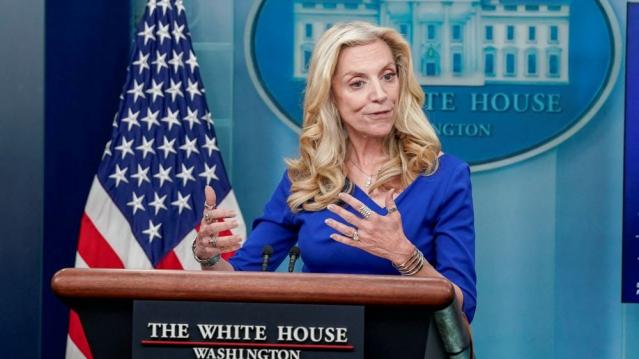Biden White House Lays Out Plan for Coming Tax Showdown

Good evening and welcome to the weekend! The most severe solar storm to hit the United States since 2005 is underway and is expected to last through Sunday. It could potentially disrupt communications, the electric power grid, navigation, radio and satellite operations, according to the National Oceanic and Atmospheric Administration, which also notes that geomagnetic storms can trigger “spectacular displays of aurora,” which in this case might be seen as far south as Alabama.
Here's what else you should keep an eye on.
Top Biden Advisor Lays Out Five Principles for Coming Tax Showdown
With many of the 2017 Republican tax cuts set to expire after next year, the White House and Congress are already laying the groundwork for a huge battle over the tax code. On Friday, President Joe Biden’s top economic adviser laid out the administration’s principles for the fight ahead.
On the heels of a report from the Congressional Budget Office saying it would cost more than $4 trillion over a decade to extend the 2017 tax cuts, Lael Brainard, director of the White House National Economic Council, said Friday that the Biden plans to reduce the deficit by raising taxes on corporations and the wealthy, while maintaining his pledge to not raise taxes on American households earning less than $400,000 a year.
“We have a major economic policy decision that lies ahead: whether to return to the trickle-down policies of the past or forge ahead with a different approach, the president’s approach to grow the economy from the middle out and the bottom up,” Brainard said at an event hosted by the Hamilton Project at the Brookings Institution. “The expiration of Trump’s 2017 tax package next year will put tax fairness front and center. Do we want a tax system that favors the wealthy or the middle class?”
Brainard criticized the Republican tax law, arguing that it had made the tax system less fair, hurt the country’s fiscal health and failed to deliver the promised economic benefits.
She also laid out five guiding principles for the administration’s approach to tax policy in its potential second term:
* Pursue a tax system that rewards work, not wealth. Biden wants to extend or renew tax breaks for middle- and working-class households, including an enhanced child tax credit and continued subsidies for health insurance. Tax cuts for wealthy households would be allowed to expire. “Our tax system should be fair,” Brainard said. “It should reward work, not wealth. It should give tax cuts to working- and middle-class families to give them a fair shot while asking the wealthiest households to pay their fair share.”
* Raise revenue and fully pay for any tax cuts that are extended. “The aging of the population directly increases fiscal pressures on programs that are the bedrock of financial security for Americans, and tax revenue must keep pace,” Brainard said.
* Ask more from companies. Biden would raise the top corporate income tax rate to 28%, up from the current 21%, and the minimum corporate tax rate on large businesses would go to 21%, up from the current 15%. “Our tax system currently asks much less of corporations than it used to,” Brainard said. “In the 1950s, around 70% of our revenue came from labor income and 30% from corporate income. Today, around 90% comes from labor income and under 10% comes from corporate income. That doesn’t make any sense.”
* Help the IRS crack down on wealthy tax cheats and improve service. “We will extend the investment and oppose Republican efforts to rescind the IRA funding,” Brainard said, referring to $80 billion provided to the tax agency over 10 years through the Inflation Reduction Act.
* Avoid an international race to the bottom on tax rates. Biden wants to implement the global minimum tax negotiated by his administration and agreed to by more than 130 countries around the world. “Many of the world’s largest economies are already implementing this transformational agreement,” Brainard said. “We need to join them next year. The president’s proposal would implement the agreement and impose a 21% minimum tax on the foreign profits of the biggest multinationals.”
The bottom line: The debate over what could be major changes in tax policy in 2025 is heating up as the Biden administration lays out its plan to raise taxes on high-income households and corporations while maintaining and in some cases enhancing tax breaks for everyone else.
1 in 8 US Adults Has Taken Ozempic or Other GLP-1 Drug: Survey
About 12% of American adults say they have used one of the increasingly popular weight loss and diabetes drugs known as GLP-1s, and 6% say they are currently taking such a drug, according to a new survey by healthcare research group KFF.
More than four in 10 people with diabetes (43%) report having taken one of these drugs, such as Ozempic, Wegovy or Mounjaro, while 26% of heart disease patients and 22% of those who are obese or overweight have taken them. More than a third (38%) of those who say they have ever taken the drugs report than they used them solely for weight loss.
The survey comes after drugmaker Novo Nordisk told investors on an earnings call last week that at least 25,000 people in the United States are starting to take Wegovy each week. Novo Nordisk and other drugmakers have been working to address shortages of the medications as demand has exploded.
GLP-1 drugs can be pricey, with list prices topping $1,000 for a month’s supply, and 54% of people who have used the drugs told survey-takers that it was difficult to afford them, with 22% calling it very difficult. “While most insured adults who have taken these drugs say their insurance covered at least part of the cost, even among insured adults about half (53%) say the cost was difficult to afford,” KFF reports.
Sen. Bernie Sanders, the Vermont independent who chairs the Senate Health, Education, Labor, and Pensions Committee, last month launched an investigation into what he called the “outrageously high” prices of Ozempic and Wegovy in the United States. “As important as these drugs are, they will not do any good for the millions of patients who cannot afford them,” Sanders wrote in a letter to Novo Nordisk’s CEO. “Further, if the prices for these products are not substantially reduced, they have the potential to bankrupt Medicare, Medicaid and our entire health care system. The United States Congress and the federal government cannot allow that to happen.”
Medicare is prohibited by law from covering prescription drugs used specifically for weight loss, but 61% of adults in the survey that the government healthcare program for the elderly should cover GLP-1 drugs for people who are overweight.
“The poll also tested the impact of arguments for and against Medicare coverage, with short descriptions explaining that it could increase premiums for people with Medicare and place financial pressure on the Medicare program and the federal budget, but that it could help more people afford the medications and improve the health and quality of life of people who are overweight,” KFF explained in a news release. “Those arguments did little to change the public’s views, with similar shares of the public overall and the various subgroups continuing to favor Medicare coverage.”
KFF surveyed 1,479 adults online and by phone from April 23 to May 1. The results have a margin of sampling error of plus or minus 3 percentage points.
Fiscal News Roundup
- Biden Looks to Raise Tax Revenue When Trump Cuts Expire Next Year – New York Times
- Brainard Vows Corporate Tax Hike With Trump Cuts Set to Expire – Bloomberg
- Green Transition Is Stitched Into the Tax Code: White House Economist – The Hill
- US Consumer Sentiment Drops to 6-Month Low on Inflation, Unemployment Fears – Associated Press
- Federal Dollars to Increase Bird Flu Testing for Dairy Cows, Farm Workers – Washington Post
- US Announces $400 Million Military Aid Package for Ukraine – CNN
- Biden Administration Set to Revamp Trump’s Tariff Program After Multi-Year Review, Sources Say – CNN
- Hoping Tensions Ease, House Republicans Still Brace for More Drama – Washington Post
- Mike Johnson Told Us What He Really Thinks About Joe Biden, Hakeem Jeffries and Donald Trump – Politico
- Bowman Sees Fed On Hold With No 2024 Cuts With Inflation Lingering – Bloomberg
- Justice Department 'Upping Its Game' on Healthcare Antitrust Enforcement With New Task Force – Fierce Healthcare
- Ascension Hospital Hack Disrupts Ambulances, Procedure Schedules – Bloomberg
- Ted Cruz, Better Known For Derailing Bills, Tries On a New Hat: Legislator – New York Times
- Newsom Announces $45B Deficit in Downsized Budget Proposal – The Hill
Views and Analysis
- Biden Tax Plan’s Twin Challenges: Keeping His $400,000 Pledge and Paying for It – Richard Rubin, Wall Street Journal
- 5 Myths About Social Security as the Program Faces a Funding Crisis – Michelle Singletary, Washington Post
- Trump Thinks His Anti-Green Culture War Is Worth a $1 Billion Donation – Philip Bump, Washington Post
- Yes, Interest Rates Really Are High Right Now – Neil Irwin, Axios
- Fetterman, Smith Want a Senate Mental Health Commission – Dan Diamond, Washington Post
- No, Donald Trump, Biden’s Economy Is Not Like Weimar Germany’s – Peter Coy, New York Times

